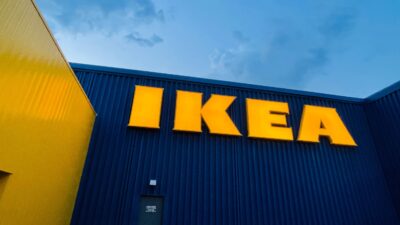Sandra Peter and Kai Riemer

The truth, free speech and platform design on The Future, This Week
This week: the truth, free speech and the design of online platforms. Sandra Peter (Sydney Business Insights) and Kai Riemer (Digital Disruption Research Group) meet once a week to put their own spin on news that is impacting the future of business in The Future, This Week.
The stories this week
02:44 Twitter bans political ads
18:15 What a scam on Airbnb reveals about platform design
Other stories we bring up
Remember that scary AI text-generator that was too dangerous to release? It’s out now
Our March 2019 conversation about the new AI fake text generator that was too dangerous to release
Twitter’s ban on political ads
Facebook’s founder Mark Zuckerberg rules out banning political adverts
Political ads at Facebook make money by manipulating us
The real reason Facebook won’t fact-check political ads
Cloudflare CEO Matthew Prince decides to kick someone off the internet
Our December 2018 discussion on fake restaurants
You can subscribe to this podcast on iTunes, Spotify, Soundcloud, Stitcher, Libsyn, YouTube or wherever you get your podcasts. You can follow us online on Flipboard, Twitter, or sbi.sydney.edu.au.
Our theme music was composed and played by Linsey Pollak.
Send us your news ideas to sbi@sydney.edu.au.
Dr Sandra Peter is the Director of Sydney Executive Plus and Associate Professor at the University of Sydney Business School. Her research and practice focuses on engaging with the future in productive ways, and the impact of emerging technologies on business and society.
Kai Riemer is Professor of Information Technology and Organisation, and Director of Sydney Executive Plus at the University of Sydney Business School. Kai's research interest is in Disruptive Technologies, Enterprise Social Media, Virtual Work, Collaborative Technologies and the Philosophy of Technology.
Share
We believe in open and honest access to knowledge. We use a Creative Commons Attribution NoDerivatives licence for our articles and podcasts, so you can republish them for free, online or in print.
Transcript
This transcript is the product of an artificial intelligence - human collaboration. Any mistakes are the human's fault. (Just saying. Accurately yours, AI)
Disclaimer We'd like to advise that the following program may contain real news, occasional philosophy and ideas that may offend some listeners.
Intro This is The Future, This Week on Sydney Business Insights. I'm Sandra Peter, and I'm Kai Riemer. Every week we get together and look at the news of the week. We discuss technology, the future of business, the weird and the wonderful, and things that change the world. Okay, let's start. Let's start!
Sandra Today on The Future, This Week: the truth, free speech and the design of online platforms. I'm Sandra Peter, I'm the Director of Sydney Business Insights.
Kai I'm Kai Riemer, professor at the Business School and leader of the Digital Disruption Research Group. So what shall we talk about?
Sandra Well, we were gonna get the AI text-generator to do our entire podcast today, because do you remember that scary AI text-generator we discussed on the podcast a while ago?
Kai Oh, yeah. Yeah, yeah. OpenAI?
Sandra Yeah. That's was too dangerous to release.
Kai Yeah. That was way too dangerous, and they held it back.
Sandra Well, it's out now.
Kai They've released it?
Sandra Yep. OpenAI this week published the spooky text-generator that we've been talking about since February. And if you recall, in February, they said "Due to our concern about malicious applications of the technology. We are not releasing the model". Well, it's out today. If you go to talktotransformer.com, you can give it a prompt, including lines from Shakespeare or conversational items, beginning of articles, and it will fill out the rest.
Kai So if I put in: So Sandra, what happened in the future this week? You mean we could just go home and let it do our work?
Sandra Yeah.
Kai That's the promise?
Sandra That is the promise.
Kai Feed it into Lyre Bird with our voices and there we have a podcast.
Sandra We should definitely try to do that.
Kai We're going to...
Sandra Next week?
Megan Woohoo.
Kai Oh, that was Megan. But Megan, you know, we won't need an editor then either, so...
Megan Woohoo!
Kai Oh, okay. Okay, I see.
Sandra Or hosts.
Kai Or hosts. So maybe for the Christmas...
Megan Woohoo!!
Kai Maybe for the Christmas special we'll get a story read out by the AI and see how much it can do. But seriously, we need to talk about Twitter.
Sandra Yes. We need to talk about Twitter, and it kind of fits with this theme of what is fake and what is truth online. So not only do we have scary AI text-generators, Twitter is now to ban all political advertising.
Kai So that means we also have to talk Zuckerberg.
Sandra And Facebook.
Kai Truth, fake and Zuckerberg go in the same sentence.
Sandra And I think we should talk about the Airbnb story you were telling me about.
Kai That is an interesting story. It's a long read, so we'll keep that short, but it ties in with the same theme. So, you know, truth. That's the theme.
Sandra Let's get started.
Kai OK. So Sandra, what happened in the future this week?
Sandra So Twitter is to ban all political advertising, the first story is from the BBC. And last week, Twitter announced that they will ban all political advertising worldwide, saying that such messages should be earned and not bought. And the tweet from company CEO Jack Dorsey said that while Internet advertising is incredibly powerful and very effective for commercial advertisers, that power brings significant risks to politics.
Kai And, of course, he takes a dig at Mark Zuckerberg. Dorsey can't help himself. This week, Facebook released a new logo and Dorsey was at it again with a bit of a dig at their rivals at Facebook. Now, you could look at this and say, OK, Facebook has made the decision to allow all political advertising. And that has been a big story, we're going to get to this. You could say maybe Twitter is in a better position to ban it because they make nowhere near as much money from advertising than Facebook does. And that is kind of the story here. So let's take a closer look at what the timeline behind this is.
Sandra So a couple of weeks ago, Senator Elizabeth Warren ran an ad on Facebook and this was an intentionally misleading ad to make a point. She was claiming that Mark Zuckerberg had personally endorsed Donald Trump for re-election. And she was using the ad to protest against Facebook's decision to allow political advertising and to show that you could basically say anything you wanted.
Kai ] Exactly. So the controversy being that Facebook should patrol and police political advertisements, especially when they make intentionally untruthful claims. And so she wanted to force Facebook's hand to make a decision about this.
Sandra And their decision was that they will allow advertising. Mark Zuckerberg said that he does not think it is right for a company to censor politicians or the news in a democracy. And he ruled out banning political advertising altogether. And even a letter signed by more than 250 Facebook employees who basically said that 'this is our company, this is not what we stand for', did not sway Zuckerberg in the direction of doing anything about it. They still stand firm and say 'anyone can say anything they want', pretty much.
Sandra Yes. A week later, Twitter did come out and ban all political advertising. And here are some of the reasons that Twitter listed for doing this. First, Jack Dorsey said the "Internet political ads present an entirely new challenge to civic discourse". And he listed here things like "machine learning-based optimisation of messaging, micro-targeting, unchecked or misleading information", and even deepfakes were listed here. And we'll put links in the show notes to all our episodes discussing the fakes, including the tax generator from today. And he continued to say that he believes that they're working very hard to stop people from gaming Twitter and gaming their systems to spread misleading information, so they couldn't stand for someone paying them to target people to see political ads in which they could say pretty much whatever they want. As we've seen in the Elizabeth Warren Ad.
Kai So there's a number of issues we want to raise here. The first one would be the practicalities of actually banning advertisements. The second is the claim that allowing advertisements is a matter of free speech. And we also wanted to highlight the power that the CEOs of these platforms hold in making such decisions. So let's look at how easy or how straightforward is it actually to ban advertisements, or decide what's true and false.
Sandra First, Twitter's decision puts them in a position where they have to decide what is and what is not political. If we think about political speech, identifying an ad for a specific candidate is very straightforward. But identifying political issues in ads might not be that straightforward. And there are a couple of articles that will put in the shownotes, including from the BBC and from The Guardian, that raise the issue of some legislative topics that come up and where you have lots of ads for and against, where it's quite difficult to tell whether they are or they are not political ads. So this would be issues like climate change, or healthcare, or immigration, or taxes or national security. All of these categories are really, really broad categories where whether or not an ad is a political ad or not is difficult to tell. And this would put Twitter in this instance, but it would also put Facebook or Google or any other company, in the position to decide to what extent this is or is not a political issue. So how should we define political issues around healthcare? Is promoting healthcare centres a political issue? Is promoting women's healthcare a political issue? How about things that would promote birth control or climate issues? When do these things become political, and whether or not you define it would draw the line on what is or isn't considered a political ad.
Kai So it sounds like a straightforward decision to say, 'OK, we're going to ban political ads'. It's straightforward when it comes to ads that talk about a candidate and that is paid for by a candidate. But the worry here is that we will just see political advertisement become a little bit more subversive, will be more about the issues. And then, of course, it is very hard. And again, a pretty broad grey area in which decisions have to be made, whether this is now a political ad or just a legitimate 'issues ad', so to speak.
Sandra This is not an issue just for political parties. This is an issue for not-for-profit organisations. This is an issue for a variety of advocacy groups. If you think about immigration or healthcare or climate, or an issue for a number of trade groups and trade associations that might want to influence public conversation around some of these issues. So it's quite difficult to draw a line as to what is or is not political advertising.
Kai And Twitter doesn't have a particularly good track record in discerning who's a political player or not. There have been instances where journalists' accounts or media accounts that are legitimate neutral reporters, have been classed as political by Twitter's algorithms, because they report on certain issues.
Sandra And this is one of the reasons why Facebook has decided not to change its political ads policy at all. So ignoring all calls to ban ads altogether. And not only that, but going as far as to say that they will not crack down on these ads and that it's not their role to censor politicians or what they say in a democracy.
Kai And there have been a number of interesting articles that came out as well on the back of this. The first one in The New York Times titled "The Real Reason Facebook Won't Fact-Check Political Ads". And so, one thing that is being pointed out there is that it's not actually that easy to weed out what is a lie and what is the truth in political advertising. You can very much discern certain blatant lies, but a lot of political claims are in a grey area, such as the example of an ad run during the World Series where the Republican Party claims that Donald Trump and its government have created six million jobs.
Sandra Clearly, you cannot say one person has created six million jobs...
Kai So is this a lie?
Sandra You can't pinpoint the exact moment in time where these six million jobs were created.
Kai Exactly.
Sandra Or whether they're a result of policy that has been implemented two years ago, or five years ago or even 10 years ago.
Kai But even if it's not completely truthful, this is the sort of message that we're used to from politicians, which is clearly different from accusing an opponent of something that they clearly haven't done. But again, it's this grey area. And so the point that is being made is, and this is a concern for all of these kinds of digital platforms, is that any solution to weed out lies in political advertising would not scale. So you would need a lot of people who would have to pass judgment. There would be a lot of controversy. And we're not just talking presidential election. We're talking Senate elections, state elections. We're talking 20 Democratic candidates all doing political advertising. And we're also talking different countries, Brexit. In other words, you would need lots and lots and lots of people who would have to pass judgment on whether or not something is a lie or not. So that's one reason, the cost issue that Facebook doesn't want to take on, because it's not that straightforward. And then, of course, there's the economic reality of losing out on advertising dollars if they were to ban political advertising at all. Because a lot of these ads, be they truth or lie, bring in income for Facebook.
Sandra So whilst there's an economic argument behind this and let's not forget, political advertising is worth much less for Twitter than it is for Facebook, so Facebook has a much bigger economic incentive to talk about this. The entire public discussion around this has been couched as an issue of democracy and free speech. So we wanted to take apart a bit that conversation around free speech, because the arguments both in the BBC article, The New York Times and The Guardian spoke a lot about who has the right to express themselves and what that content may or may not look like. And that was indeed how Jack Dorsey spoke about it, and how Mark Zuckerberg talked about it, about people having the freedom to say the things they want to say.
Kai So Zuckerberg, in a conference call with journalists said, "In a democracy, I don't think it's right for private companies to censor politicians or the news." And that sounds like a lofty goal and a nice thing to say, to couch Facebook as the upholder of free speech and freedom of expression. But as the article in The New York Times put it, it's a little bit disingenuous in the first instance, because Facebook is known to very much censor content in other countries. And the article mentions Pakistan, India, Turkey, where the governments have clear rules about what to censor, and Facebook happily complies with those rules to be able to trade in these countries. So to say 'we're all for freedom of speech' is a little bit disingenuous. But we also wanted to take a bit of a look at what we actually mean by speech, because we tend to think about it exclusively in terms of what someone can say. And we can't stop people from saying what they want to say and forget the audience part of this.
Sandra For that, we would need to remember how does content and how do messages reach their audience on platforms like Twitter and Facebook? And the fact that this is done by an algorithm that, for all intents and purposes, is opaque to the people who receive that message, and to the person delivering that message as well. So when you say something on Twitter, when you post something on Facebook, the algorithm decides the optimal audience that your message should reach, and that is not optimised to ensure that your message reaches the people it needs to reach, but rather to drive engagement on the platform and indeed advertising spend.
Kai And I think this is a really important point. So a quick look at the dictionary tells us that speech is a formal address or discourse delivered to an audience. We only tend to focus on one half of that definition, which is the delivery part or the content part. You know, we can express whatever we want, but forgetting that speech has an audience. And Facebook is very much involved in deciding who the audience is, who gets to see what message, and to enable people to say different things to different audiences in the political discourse, to pretty much manipulate them into voting for them, for example. So for Facebook to say that they provide a platform for free speech. It's an incomplete argument, problematic in so far as we tend to forget that they are the ones who control the audience part of that free speech equation.
Sandra Which brings us to one more thing we wanted to say about these stories, which I think is often underscored by the free speech conversations, which is the power of the CEOs that some of these companies have in deciding what counts as free speech, and how we talk about it than even what truth then looks like on these platforms. And our examples are always Twitter and Facebook. And Mark Zuckerberg is the one who always gets flaunted as the example for this. So we thought we'd bring in another example.
Kai And that example is a company called Cloudflare, and Cloudflare provides infrastructure for the content that we see on the Internet. So it basically sits between the actual servers that have the content and our browsers, and it is responsible for about 10 percent of content distribution in the US, so it has a very key position to make sure that we all can see the websites that we want, at a certain speed. So it provides a important backend service. So it's in a key position to control who gets to see what on the Internet. And that's the important bit here.
Sandra And last year, one fine morning in August, its CEO Matthew Prince, sent an internal company email in which he had decided to basically kick some people off the Internet. And I quote from the internal email: "My rationale for making this decision was simple: the people behind the Daily Stormer are assholes and I'd had enough", Prince wrote. "Let me be clear: this was an arbitrary decision". He continued "I woke up this morning in a bad mood and decided to kick them off the Internet... It was a decision I could make because I'm the CEO of a major Internet infrastructure company".
Kai So we're talking about one guy in a bad mood one morning banning the Internet content of an entire group. In this case, unashamed white supremacists, off the Internet. And while many people would, and have, applauded this decision, it goes to highlight how much power certain individuals in key positions providing the infrastructure for our daily conversations online hold in making such decisions. And of course, it's Zuckerberg, it's Dorsey, but it's also people that most of us have never heard of...
Sandra Who can just wake up one morning and decide to kick someone off the Internet because they were in a bad mood. And if it's a far right neo-Nazi group, white supremacist group, no one thinks twice about that decision. It still highlights that this can be an arbitrary decision that can be made overnight by a few people in the world.
Kai And so for a person like Mark Zuckerberg, to say that Facebook is the defender of free speech and freedom of expression is problematic, not only because he seems to be the person who can make that decision, but also because the platforms are not designed to actually deliver a level playing field for freedom of expression to occur, as we've discussed with the audience aspect of free speech.
Sandra Which is why I think we should discuss our second story, Airbnb, because that continues to highlight the role that the design of these platforms actually play in what turns out to be truth online.
Kai So this story comes from VICE, and it's titled "I Accidentally Uncovered a Nationwide Scam on Airbnb".
Sandra And as discussed, Kai will give you the short version of this. This was a long-form article where the story just went on and on and...
Kai This is one of those articles that are designed for you to read on a lush Sunday morning over a coffee, because it does go on and on, and it is very detailed.
Sandra More like a rainy Monday afternoon.
Kai It's written by a journalist by the name of Allie Conti, who reports on her own experience with Airbnb, and it's worth giving you a little bit of that story. So, Allie was on a holiday trip to Chicago with a couple of friends, and she had rented out this nice house that they were going to spend the weekend in. And they were having drinks in a restaurant, about to walk over to the house, when they received a call that unfortunately there had been a plumbing incident, and the house was currently unavailable. But the hosts, Becky and Andrew, Andrew being on the phone apparently, had an alternative for them, which was a house that was supposedly even much bigger, and wouldn't they be happy to go to the other house instead? Faced with the decision to either cancel and be left with nothing and having to find a hotel or going to the alternative, she reluctantly agreed. Now, when the Uber got to the address, the correct address didn't exist, and it took them a little while to find what appeared to be a guest house in a back alley, which turned out to be much bigger, yes, but also a bit of a dump. Grimy, dark, not much furniture, lots of beds in the bedrooms, and really not what they had hoped for. So the long and short of this was that they had agreed to stay there, they had to move out after a day because the house didn't become available, but new guests had to move into this house, and it turned out to be rather unpleasant, so she had to book into a hotel. She decided not to spoil the weekend and sorted out with Airbnb later. Now, to her surprise, she was offered only a fraction of her total cost of $1200, that is about $400 as a refund. More talks with the hosts didn't lead anywhere other than a disturbing message that the host was expecting a five star review, and any conversation should occur in private. So she was pretty worked up about this and started to think, what did I miss? How did that all go south? And so she started investigating. In the course of her investigation, she found more properties by the same couple, other properties by other couples who were somehow related by leaving comments for each other. All sporting different pictures of different houses with the same furniture. So she dug a bit deeper, and she found people leaving a few scattered negative reviews with similar experiences to her. And so she got in contact with these people, and those stories matched hers. And so as she pulled threads, she unravelled this story where she came across five different accounts, all of couples, the pictures of which seemed to be sourced from stock photography websites and a total of 94 properties in eight cities that seemingly did not exist, where people were then bumped into these rundown, pretty worthless houses, never being refunded by Airbnb the full amount. And so the hosts pocketing a fair bit of money more than they would ever get for renting out these dumps in the first place. So she discovered this big scam on Airbnb.
Sandra So our story has a very unsatisfying ending. The journalist eventually did find out who the hosts were, found out that there was this company in LA, tried contacting them, they eventually went quiet. Airbnb did not solve the dispute, did not refund the money, and the company, who was not talking to the journalist anymore, did not remove any of the fake listings, just made them so expensive, $10000 a night, that they wouldn't show up in people's search results anymore.
Kai So only the fake host couple that had rented to her, they disappeared. The other host couples, the other listings pretty much still exist. And so why does this matter?
Sandra It matters because it seems that even with reputable companies like Airbnb, the design of the platforms make it so that it is actually fairly easy, if you have an incentive, to create fake listings. We spoke last Christmas about The Shed, which was the number one restaurant in London that was completely fake and didn't exist. Now we see these scams on Airbnb. But it's probably the fact that there's actually a more subtle point to make here. It's not about scams or fake restaurants, but it's about the subtle incentives built into these platforms that do not optimise for true reviews or true evaluations of property, but rather for positive, optimistic ones that avoid confrontation. And if you do that repeatedly and at scale, then the truth gets lost in the conversation. So just to explain that, in the case of Airbnb, you obviously review the listing, but the hosts also review you. So there is an incentive not to be too negative about things, because of retaliatory reviewing. Same thing with Uber. And this is a conversation we have quite often about the fact that when you step into an Uber, you know you're being reviewed by the driver, so even though you might want to sit in the back seat and not have a conversation, or read your email or talk to someone else, you smile and you play nice and you put on a face just to make sure that you get that five star rating.
Kai Because you want that perfect rating, whether it's for ego or because it actually has material consequences on the platform if your review isn't good. Now, remember, in the case of Airbnb, if you're an occasional guest somewhere, one negative review from a host can destroy your profile and someone might not want to let you stay at their property. When in fact, for the hosts, in this case the fake host, they can bury a few negative reviews in a flurry of other reviews whereby the incentive that Airbnb puts forward by having this reciprocal reviewing going on is actually to not be confrontational, to not seek a dispute with the hosts, because as the journalist point out in this article, she found a few people who actually had taken it up with the fake hosts, this company in LA that was behind it, and were then left with very negative reviews where blatant lies were propagated, they were partying and leaving behind beer bottles and trashed the place. When in fact, none of this was true because they ended up in this grimy guesthouse. But it can actually destroy the reputation as a guest. So there's incentives baked into the platform not to be truthful about negative experiences because you don't want to forfeit your profile, your reputation on the platform.
Sandra And we'll add a paper to the shownotes that actually looks at the way in which these trusted community marketplaces can distort the reality of the experience. And the paper, titled "A First Look at Online Reputation on Airbnb, Where Every Stay is Above Average", tries to help explain why Airbnb hosts consistently receive higher ratings than hotels reviewed on TripAdvisor, for example.
Kai So what we're saying is that the very design of these platforms propagate positivity, and suppress the truth when it comes to negative experiences, because that would not be in the best interest of the platform provider who wants to drive engagement and transactions. So negative reviews will put people off, will basically hamper and put friction into the system of making sales. But I also want to highlight one more thing, which is scale or scalability. It's the same issue as with Facebook. Looking at every ad and discerning whether it's true or lies is almost impossible at scale, and so is vetting every host and every listing for Airbnb, even though the platform makes it seem like all the hosts have been vetted and all the listings have been seen by Airbnb, when this is clearly not the case, as this article points out.
Sandra So what all the articles seem to point out today is that truth is in the platform design.
Kai So let's remember that these platforms, be it Airbnb or Facebook, are designed for scale. They're designed for growth. Millions and billions of people interact on these platforms. And so in order for this to function most effectively, the design needs to reduce friction. Having to fact check ads will introduce friction. It's very hard to check and verify every account on the platform, every listing on the platform. So at some point, once a certain scale is reached, something's got to give. But also, the way in which users evaluate and leave reviews for each other is again designed to drive engagement. And we also need to be reminded of the economic reality of how these platforms are monetised. So in the case of Facebook, it's the algorithms that monetise the data for advertisements. And so, after considering all of this, it is clear that truth will only feature in so far as it doesn't get in the way of these design principles.
Sandra And whilst free speech seems to be a bullshit argument in the case of Facebook, we do have to commend Twitter for having a go, and for now, revealing just how difficult it is to actually put truth ahead of the way the platforms are designed, then monetise.
Kai And conversely, the conclusion is, of course, if we want to do something about truth on the Internet and we want to make sure that we have less misinformation, fake news and fake accounts, it is the very design and business models of these platforms that have to be scrutinised.
Sandra And the truth is, that's all we have time for today.
Kai We leave you with this title for a research study: "Say what you want, but we decide who hears it. Free speech and algorithmic content distribution on online platforms". More truth next week.
Sandra On The Future, This Week?
Kai Yes. But next week.
Sandra On The Future, This week. Next week. Thanks for listening.
Kai Thanks for listening.
Outro
This was The Future, This Week, made possible by the Sydney Business Insights team and members of the Digital Disruption Research Group. And every week right here with us, our sound editor Megan Wedge, who makes us sound good and keeps us honest. Our theme music was composed and played live on a set of garden hoses by Linsey Pollak. You can subscribe to this podcast on iTunes, Stitcher, Spotify, YouTube, SoundCloud, or wherever you get your podcasts. You can follow us online on Flipboard, Twitter or sbi.sydney.edu.au. If you have any news that you want us to discuss, please send them to sbi@sydney.edu.au.
Close transcript







